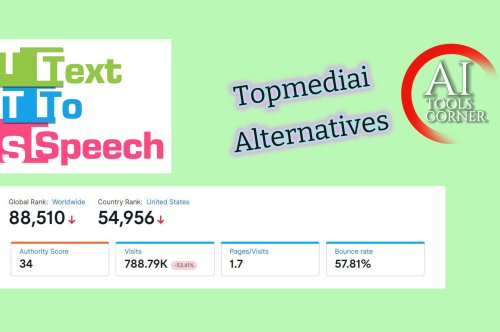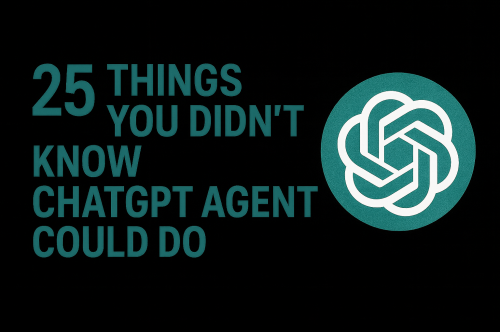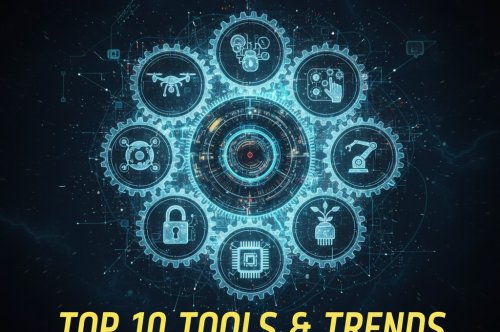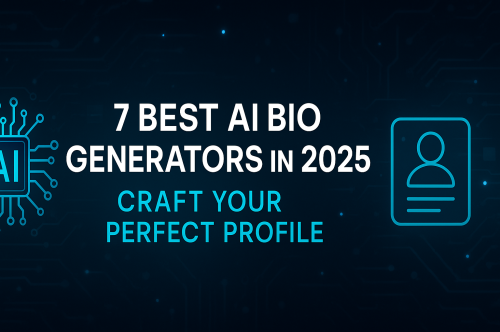25 Powerful Ways ChatGPT Agents Can Revolutionize Your Work and Life: With Prompts
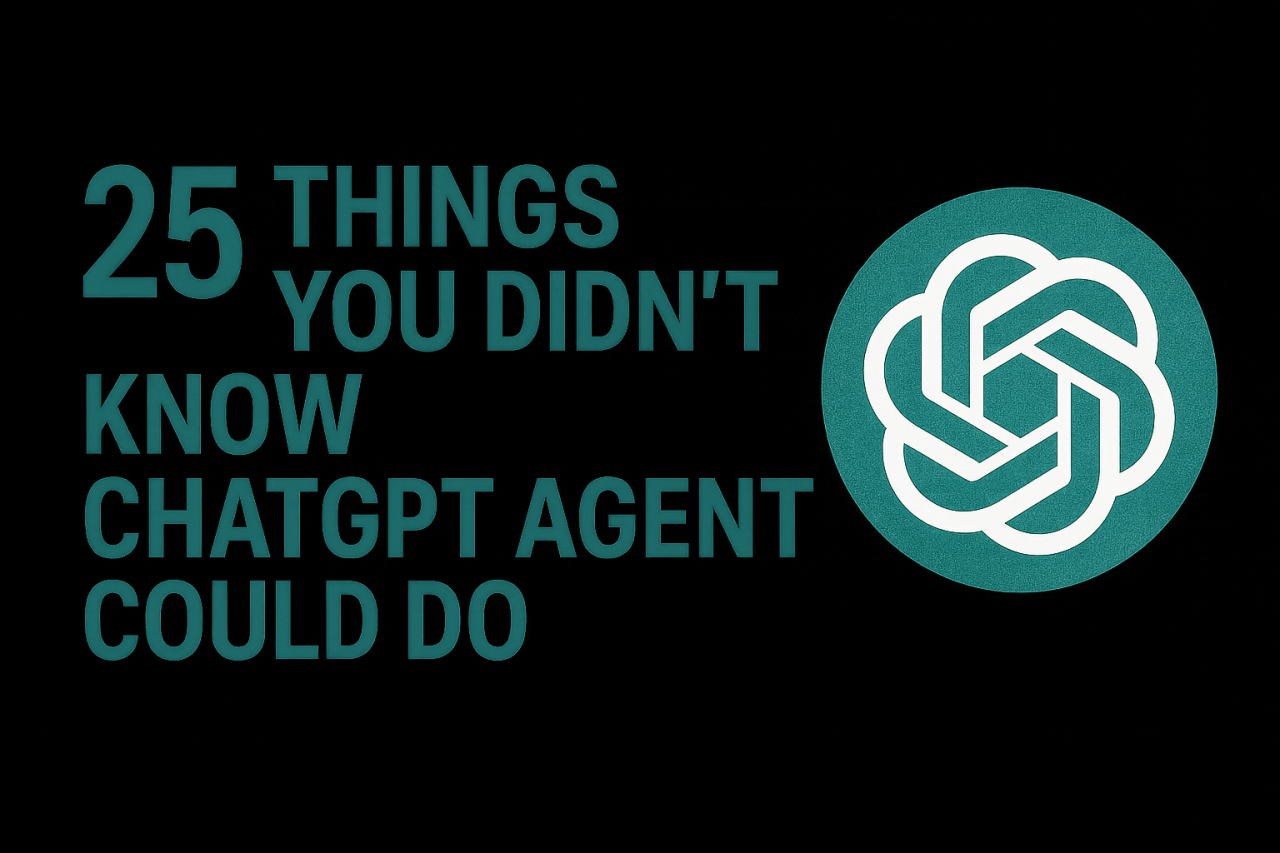
Imagine this: you wake up, grab your coffee, and before you even check your inbox, your AI assistant has already:
-
Researched the perfect investment property for you.
-
Written 30 days of social media content in your unique voice.
-
Analyzed your competitors’ websites and sent you a pricing report.
-
Scheduled your grocery delivery for tonight.
Sounds like science fiction?
Not anymore.
With OpenAI’s ChatGPT Agents, this is completely possible — today.
In this mega guide, I’ll share 25 detailed, practical, and game-changing ways you can use ChatGPT Agents to transform your workflow, free up hours every week, and even grow your business.
Whether you’re an entrepreneur, creator, freelancer, or just curious about AI, this guide will give you actionable ideas you can start testing right away.
The Big Idea: Why ChatGPT Agents Are Different
Before we jump into the use cases, let’s clarify what makes ChatGPT Agents special.
Unlike standard ChatGPT, which simply responds to your prompts, ChatGPT Agents can:
-
Connect to external tools like Notion, Google Drive, and your email.
-
Take actions based on results (not just give you text).
-
Run on schedules so work happens automatically — even while you sleep.
-
Follow step-by-step instructions like a human assistant.
Think of them as a virtual intern who never gets tired, never asks for a raise, and works 24/7.
How We’ll Explore These 25 Use Cases
We organized these use cases into five major categories for a smoother reading experience:
-
Personal Productivity & Automation (agents that save you time day-to-day)
-
Content Creation & Marketing (agents that help you create and grow)
-
Research & Analysis (agents that deliver insights fast)
-
Business Operations & Growth (agents that make you money)
-
Lifestyle & Everyday Life (agents that improve life outside of work)
Let’s dive deep into each one.
1. Personal Productivity & Automation
These agents are your time multipliers. They handle repetitive tasks, keep you organized, and make sure nothing slips through the cracks.
1.1 Weekly Automated Reports
Set up a ChatGPT Agent to pull data from multiple sources — your website traffic, email sign-ups, social media analytics — and deliver a single, clean report to your inbox every Monday morning.
This eliminates the need to log into multiple dashboards. For example, an entrepreneur could wake up to a PDF report summarizing last week’s growth metrics, top-performing content, and key action items.
Detailed Prompt:
You are my weekly business intelligence analyst.
Goal: Give me a single report with key business metrics every Monday morning.
Step 1: Connect to Google Analytics (website), Twitter Analytics, Instagram Insights, and Stripe (revenue).
Step 2: Pull data for the last 7 days on:
- Website visitors, top 5 pages, average session time
- Social followers gained, engagement rate, top 3 posts
- New customers, revenue, churn rate
Step 3: Compare this data to the previous 7 days and calculate percentage change.
Step 4: Identify any anomalies or opportunities. Example:
- “Traffic spiked 22% on Thursday — likely from newsletter campaign.”
- “Instagram carousel posts performed 40% better than single images.”
Step 5: Format this as a 2-page PDF report with:
- Executive summary (one paragraph)
- Metrics table with % change
- Key insights and 3 recommendations for next week
Step 6: Email me the PDF at 8:00 AM every Monday.
1.2 Calendar Audits & Time Optimization
Ever wonder where your week went? Let your agent analyze your Google Calendar from the last 3–6 months and categorize time spent by activity (meetings, deep work, admin tasks).
You’ll get a breakdown showing where you’re wasting time and actionable suggestions to reclaim hours — such as batching calls or setting focus blocks.
You are my Time Management Coach.
Goal: Audit my time and recommend optimization strategies.
Step 1: Pull events from my Google Calendar for the past 90 days.
Step 2: Categorize events into groups:
- Deep Work / Focus Time
- Meetings / Calls
- Admin Tasks
- Personal
Step 3: Visualize in a table: Hours per category per week.
Step 4: Calculate % of time spent in each category.
Step 5: Identify patterns: e.g. “Tuesday has 6 hours of meetings, leaving no focus time.”
Step 6: Recommend 3 actionable strategies to save at least 5 hours per week, e.g.:
- “Batch all 1:1s into a single day.”
- “Turn 30-min status updates into async Slack updates.”
Output: PDF + bar chart.
1.3 Task Scheduling and Recurring Automation
Instead of manually running prompts, set agents to run on a schedule. For example:
-
Generate your content ideas every Monday.
-
Compile customer feedback every Friday.
-
Send personalized reminders for team members every morning.
The key is consistency — and automation ensures you never forget.
You are my Standup Summary Assistant.
Goal: Summarize team activity at the end of each day.
Step 1: Scrape #project-alpha Slack channel between 9:00 AM – 5:00 PM.
Step 2: Identify tasks completed, blockers raised, and new tasks assigned.
Step 3: Categorize by team member.
Step 4: Output a structured summary:
- Completed
- In Progress
- Blocked
- Action Items for Tomorrow
Step 5: Email to team at 5:30 PM with subject: “Daily Project Summary.”
2. Content Creation & Marketing
If you’re a creator, marketer, or business owner, these use cases are gold. They help you produce content at scale and stay ahead of trends.
2.1 Create Your Personal AI Training Dataset
Upload your past writing (tweets, blogs, newsletters) so the agent learns your tone and style. Then, when it writes, it sounds like you.
This is critical because AI is only as good as the data you feed it. Once trained, the agent can generate brand-accurate tweets, posts, and even emails.
You are my Brand Voice Specialist.
Goal: Build a brand style guide so future content matches my tone.
Step 1: Read these links: [add blog URLs, tweets, newsletter archives].
Step 2: Extract:
- Tone descriptors (e.g. casual, witty, educational)
- Preferred sentence structure (short/long)
- Common vocabulary and phrases
- Topics and themes I focus on
Step 3: Create a Brand Voice Document with:
- “Do” and “Don’t” examples
- Sample paragraphs that sound like me
- A quick-reference table summarizing my style
Output: Save as PDF + Notion doc for reuse.
2.2 Build a 30-Day Content Machine
Connect your agent to Notion, Google Docs, or your CMS. Give it your brand voice training data, and instruct it to generate a month’s worth of posts — fully formatted and ready to review.
In minutes, you’ll have a content calendar your team can edit or schedule.
You are my Content Production Agent.
Goal: Generate a full month of social media content.
Input: [Paste Brand Voice Document]
Step 1: Generate 30 content ideas across Twitter and LinkedIn.
Step 2: Write posts with:
- Hook (first line attention-grabber)
- Body (1–3 lines with value)
- CTA (comment, share, click)
Step 3: Add formatting (line breaks, emojis, hashtags).
Step 4: Export into a Notion database with columns:
- Date
- Platform
- Post Copy
- Status (Draft / Ready / Scheduled)
Step 5: Upload database to Notion automatically.
2.3 Develop a Winning YouTube Strategy
Your agent can analyze your channel (or competitors’) to identify content gaps, suggest video topics, and generate a 90-day roadmap with optimized titles, hooks, and thumbnails.
You are my YouTube Growth Consultant.
Goal: Build a 90-day content plan.
Step 1: Analyze my YouTube channel [link] and top 50 competitor channels.
Step 2: Extract:
- Topics of top 10 videos per channel
- Avg. title length, thumbnails styles, video length
- Engagement rates
Step 3: Identify gaps: topics competitors cover that I don’t.
Step 4: Create roadmap:
- 12 video titles with hooks
- Description templates with keywords
- Recommended upload schedule
Output: Google Sheet with columns [Title | Hook | Keywords | Publish Date].
2.4 Spot Viral Trends Before They Happen
Use an agent to monitor Reddit, TikTok, Google Trends, and Twitter for emerging topics. Get a weekly “early trends” report so you can create content around them before everyone else does.
2.5 SEO Audit & Recommendations
Your agent can run an SEO audit — check for broken links, analyze competitors, and even generate slides summarizing opportunities. Perfect for startups that can’t afford an SEO consultant.
3. Research & Analysis
These agents work like on-demand researchers — but much faster.
3.1 Competitor Analysis
Instead of manually browsing competitor sites, instruct your agent to scrape their pricing, features, and marketing strategies. It can then highlight opportunities for differentiation.
You are a Competitive Intelligence Agent.
Goal: Build a competitor matrix.
Step 1: Scrape 20 competitor websites provided in this CSV.
Step 2: Extract:
- Pricing models
- Key features
- Target audience
- Marketing positioning
Step 3: Build a comparison table with columns: Competitor | Pricing | Features | Notes.
Step 4: Identify gaps/opportunities in my business compared to theirs.
Output: PDF + CSV with data.
3.2 Customer Sentiment Mining
Have your agent crawl Reddit, Quora, Trustpilot, and app reviews to extract recurring complaints, feature requests, and praise. This is gold for product teams.
You are a Voice-of-Customer Analyst.
Goal: Summarize what customers love/hate about my product category.
Step 1: Scrape data from Reddit threads, Quora questions, and Trustpilot reviews.
Step 2: Cluster feedback into:
- Positive Sentiment (what they love)
- Negative Sentiment (pain points)
- Feature Requests
Step 3: Highlight top 5 repeated phrases in each category.
Step 4: Recommend 3 improvements based on insights.
Output: Report + word cloud visualization.
3.3 Real Estate Market Research
Give your agent property listings, and it will analyze investment potential, calculate ROI, and even recommend whether to buy or skip — saving you hours of manual evaluation.
You are a Real Estate Investment Analyst.
Goal: Evaluate if a property is worth buying.
Input: [MLS Listing link]
Step 1: Extract price, taxes, rental comps, and estimated expenses.
Step 2: Calculate:
- Monthly cash flow
- Cap rate
- ROI
Step 3: Provide a recommendation (Buy / Pass) with reasoning.
Output: Table + short investment memo.
3.4 Prompt Optimization
Your agent can write better prompts for you. Simply explain your goal, and it will generate a step-by-step, optimized instruction set that gets the best results out of GPT.
4. Business Operations & Growth
This is where things get really exciting. Agents can now help you make money — not just save time.
4.1 Sales Funnel Testing
Have the agent simulate the full user journey through your sales funnel. It can identify drop-off points, UX issues, and missed opportunities for conversion.
You are a Funnel Tester.
Goal: Identify friction in my sales process.
Step 1: Navigate my funnel from ad click > landing page > checkout.
Step 2: Record video of the journey.
Step 3: Flag points where:
- Page loads slowly
- Copy is unclear
- Calls-to-action are missing
Step 4: Recommend fixes to improve conversion.
Output: Report with screenshots + UX score.
4.2 Lead Generation at Scale
Feed your Ideal Customer Profile (ICP) into the agent. It will find hundreds of qualified leads, research each one, and draft personalized outreach emails — ready for you to review and send.
You are a Lead Generation Specialist.
Goal: Fill my CRM with qualified prospects.
Input: [ICP details: industry, company size, job titles]
Step 1: Find 500 prospects from LinkedIn and company websites.
Step 2: Research company news and personalize hook for each prospect.
Step 3: Write cold emails with:
- Personalized opener
- Value proposition
- CTA to book a call
Step 4: Export results to CSV for review.
4.3 Build Proof-of-Concept Products
Use an agent to write front-end and back-end code for prototypes. It can generate entire landing pages or web apps, which you can review and deploy.
4.4 Handle Customer Support Emails
Train the agent on past support tickets so it can draft replies, troubleshoot issues, and even look up order tracking details — leaving you to just approve and send.
4.5 Investor Pitch Decks
Upload your company overview and have the agent generate a structured pitch deck with problem, solution, market size, team, and financials — a perfect starting point before refining with a designer.
5. Lifestyle & Everyday Life
Finally, some of the most fun and personal use cases.
5.1 Personal Travel Agent
Let the agent plan a vacation — find flights, book hotels, suggest restaurants, and provide links to confirm reservations.
You are my Travel Concierge.
Goal: Plan a 5-day vacation to Tokyo.
Step 1: Find cheapest round-trip flights within my budget [insert].
Step 2: Suggest 3 hotel options near Shibuya, compare by price and reviews.
Step 3: Build daily itinerary with:
- Morning activity
- Lunch spot
- Afternoon sightseeing
- Dinner reservation links
Output: Google Doc itinerary with clickable booking links.
5.2 Grocery Shopping Automation
Paste in a recipe, and the agent will order all ingredients via Instacart for next-day delivery.
You are my Grocery Shopper.
Goal: Order ingredients for banana cream pie.
Step 1: Find a top-rated recipe online.
Step 2: Create a shopping list, excluding pantry staples (salt, oil).
Step 3: Add items to Instacart cart.
Step 4: Return checkout link.
5.3 Health Research & Shopping
Looking for the best water filter or sauna? Have the agent research options, compare reviews, and recommend the safest and most effective choice for your budget.
5.4 Creative Gift Shopping
Tell the agent who you’re buying for, your budget, and preferences. It will search for options, add them to a cart, and send you a checkout link.
5.5 Life Optimization & Time Audit
Let the agent analyze your habits, schedule, and workflows, then suggest improvements — like a personal life coach that runs entirely on AI.
Final Thoughts
ChatGPT Agents are more than a fun experiment — they are a paradigm shift in how we work.
They don’t just answer questions — they take action, integrate with tools, and work while you sleep. Whether you use them to create content, generate leads, plan your next vacation, or even optimize your health — they can give you back your most valuable resource: time.
The future of work isn’t just about working harder.
It’s about working smarter — with AI as your co-pilot.
Would you like me to expand each use case with step-by-step prompts and sample workflows (so readers can copy-paste into ChatGPT Agents)? This would push the article closer to the 5,000-word mark and make it more actionable for your audience.



